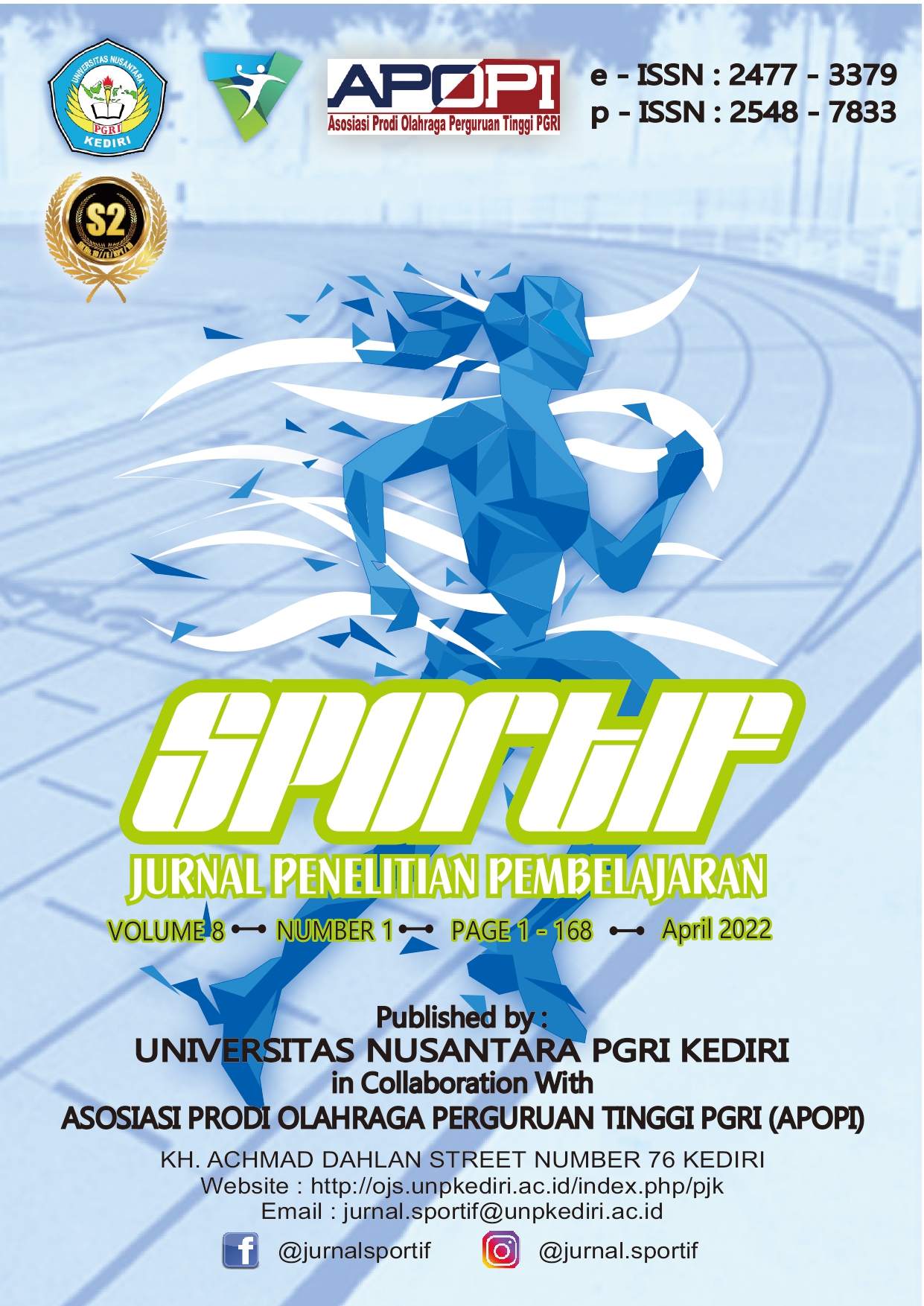Abstract
Terompah Panjang is a traditional game in Riau that needs attention. This study aims to analyze how to play and play equipment in the game. The method used is descriptive qualitative. Data were obtained by distributing questionnaires to adolescents in Riau by random sampling in the form of questions about the experience of playing the game Terompah Panjang. The sample was obtained based on teenagers who live and represent each region in Riau Province, as many as 65 teenagers. Data collection techniques through documentation techniques. Adolescents who are sampled meet the requirements as late teens (17-25 years) from the aspect of age and area of residence, which are the general public. Data collection techniques through documentation techniques. Based on the study results, it was concluded that the perspective of Riau youth in the Terompah Panjang game was that this game did not have standard rules, both in the division of teams and the number of teams, and even the length of time from the track. The game is only based on an agreement in each area. Teenagers in Riau tend to play in their home environment, not at festivals organized by the local government or related agencies.
References
Ardanari, P., Mintarto, E., Tuasikal, A. R. S., & Suroto, S. (2020). Aktivitas bermain meningkatkan keterampilan manipulatif : Review Jurnal. Gelanggang Pendidikan Jasmani Indonesia, 4(1), 79. https://doi.org/10.17977/um040v4i1p73-78
Arikunto, S. (2013). Prosedur Penelitian Suatu Pendekatan Praktik. PT Asdi Mahasatya.
Daley, A. (2018). Exercise and depression: A review of reviews. Journal of Clinical Psychology in Medical Settings, 15(2), 140–147. https://doi.org/10.1007/s10880-008-9105-z
Hendra, M. (2022). Traditional games to reinforce the character of students in terms of educational qualifications: a meta-analysis. Sportif, 7(4), 15–26. https://doi.org/10.29407/js_unpgri.v7i4.14942
Hidaya, N., & Aisna, Y. (2020). Pendidikan karakter anak usia dini sebagai upaya peningkatan karakter bangsa : Literature Review. Jurnal Hawa : Studi Pengarus Utamaan Gender Dan Anak, 2(1), 11. https://doi.org/10.29300/hawapsga.v2i1.2793
Hidayat, D. (2013). Permainan tradisional dan kearifan lokal kampung dukuh Garut Selatan Jawa Barat. Jurnal Academia.
Kurniati, E. (2013). Program bimbingan untuk mengembangkan keterampilan sosial anak melalui permainan tradisional. Pedagogia Jurnal Ilmu Pendidikan.
Lee, D., & Schoenstedt, L. J. (2012). Comparison of esports and traditional sports consumption motives. ICHPER-SD Journal of Research, 6(2), 39–44. https://eric.ed.gov/?id=EJ954495
Lubis, F. E. (2018). Sistem Kompetisi. Prosiding Seminar Nasional Pendidikan Olahraga, 442–447.
Makorohim, M. F., & Apriani, L. (2017). Tingkat kesegaran jasmani penghuni lapas Anak Kota Pekanbaru. JOURNAL SPORT AREA. https://doi.org/10.25299/sportarea.2017.vol2(2).785
Musdalipa, Kanita, A., & Sri Hartina. (2019). Anak Usia Sekolah Yang Menjalani Hospitalisasi : a Literature Review. BIMIKI, 7(5), 1–13.
Park, A.-L. (2014). Do Intergenerational Activities do any Good for Older Adults Well-Being? A Brief Review. Journal of Gerontology & Geriatric Research, 03(05), 3–6. https://doi.org/10.4172/2167-7182.1000181
Parrish, A. M., Okely, A. D., Stanley, R. M., & Ridgers, N. D. (2013). The effect of school recess interventions on physical activity: A systematic review. Sports Medicine, 43(4), 287–299. https://doi.org/10.1007/s40279-013-0024-2
Putri, A. A., Reswita, R., & Andespa, Y. (2021). Pengaruh permainan tradisional terompah panjang terhadap kemampuan motorik kasar pada anak usia 4-5 tahun. KINDERGARTEN: Journal of Islamic Early Childhood Education, 4(2), 165–172.
Ramadhani, A. (2018). Identifikasi nilai-nilai pendidikan karakter dalam permainan anak tradisional. Seminar Nasional IPTEK Olahraga, 6–10. https://ejournal.unibabwi.ac.id/index.php/semnassenalog/article/view/175
Satrianingrum, A. P., & Setyawati, F. A. (2021). Perbedaan pola pengasuhan orang tua pada anak usia dini ditinjau dari berbagai suku Di Indonesia: Kajian Literatur. JIV-Jurnal Ilmiah Visi, 16(1), 25–34. https://doi.org/10.21009/jiv.1601.3
Seriati, N. N., & Hayati, N. (2012). Permainan tradisional jawa gerak dan lagu untuk menstimulasi keterampilan sosial anak usia dini. In Lembaga Penelitian dan Pengabdian Kepada Masyarakat UNY.
Siregar, N. M., Budiningsih, M., & Novitasari, E. F. (2018). Model latihan kelentukan berbasis permainan untuk anak usia 6 sampai 12 tahun. Prosiding Seminar Dan Lokakarya Fakultas Ilmu Keolahragaan Universitas Negeri Jakarta, 3(1), 75–88. https://www.researchgate.net/publication/339274874%0AMODEL%0AJournal.unj.ac.id/unj/index.php/prosidingfik
Sugiyono. (2017). Metode Penelitian Pendidikan Pendekatan Kuantitatif, Kualitatif, dan R&D. Alfabeta.
Sulistyaningtyas, R. E., & Fauziah, P. Y. (2019). Pengembangan buku panduan permainan tradisional untuk meningkatkan kemampuan motorik kasar anak usia 5-6 tahun. JPPM (Jurnal Pendidikan Dan Pemberdayaan Masyarakat), 6(1).
Tisserand, Y., Magnenat-thalmann, N., Unzueta, L., Linaza, M. T., Ahmadi, A., Connor, N. E. O., & Zioulis, N. (2017). Mixed reality and gamification for cultural heritage. Mixed reality and gamification for cultural heritage, 421–446. https://doi.org/10.1007/978-3-319-49607-8
Wardani, D. (2019). Bermain Sambil Belajar. Edukasia.

This work is licensed under a Creative Commons Attribution-ShareAlike 4.0 International License.
Copyright (c) 2022 M. Fransazeli Makorohim, Mimi Yulianti, Alficandra

